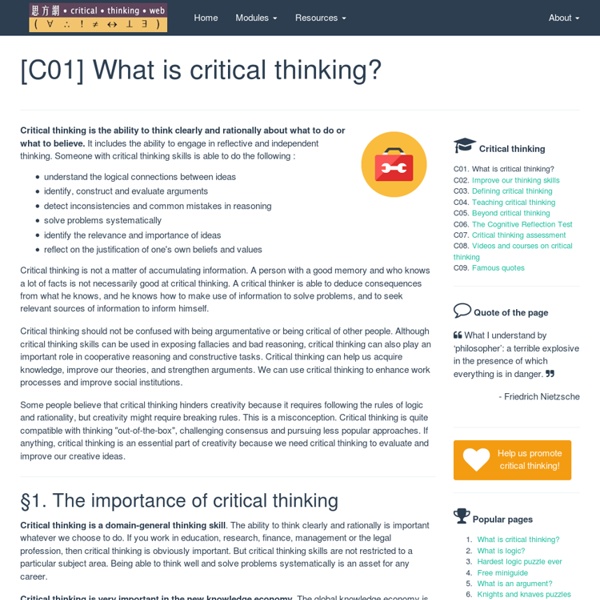Strategy List: 35 Dimensions of Critical Thought
S-1 Thinking Independently Principle: Critical thinking is independent thinking, thinking for oneself. Many of our beliefs are acquired at an early age, when we have a strong tendency to form beliefs for irrational reasons (because we want to believe, because we are praised or rewarded for believing). Critical thinkers use critical skills and insights to reveal and reject beliefs that are irrational. In forming new beliefs, critical thinkers do not passively accept the beliefs of others; rather, they try to figure things out for themselves, reject unjustified authorities, and recognize the contributions of genuine authorities. They thoughtfully form principles of thought and action; they do not mindlessly accept those presented to them. If they find that a set of categories or distinctions is more appropriate than that used by another, they will use it. Independent thinkers strive to incorporate all known relevant knowledge and insight into their thought and behavior. Go to top
The Top 10 Existential Movies of All Time
Browsing through my DVD collection recently I realized that I have a fairly decent selection of what can be called 'existential movies' -- philosophical films that study the nature of existence and what it means to be alive. It's debatable as to what defines the 'quintessential' existential movie, but ultimately it must speak to the human condition and reframe it in such a way that the viewer gains an enhanced appreciation of their own existence and situation in life. These are the kinds of films that you find yourself reflecting back upon time and time again as you engage in your own day-to-day life, struggles and relationships. Thus, I present to you the top 10 existential movies of all time: 10. The best of the 'last man on Earth' movies, The Quiet Earth (1985) looks at human nature and the value of social relationships through a post-apocalyptic lens. 9. The movie also acknowledges the harsh realities of modern relationships. 8. 7. 6. 5. 4. 3. 2. 1.
Defining Critical Thinking
It entails the examination of those structures or elements of thought implicit in all reasoning: purpose, problem, or question-at-issue; assumptions; concepts; empirical grounding; reasoning leading to conclusions; implications and consequences; objections from alternative viewpoints; and frame of reference. Critical thinking — in being responsive to variable subject matter, issues, and purposes — is incorporated in a family of interwoven modes of thinking, among them: scientific thinking, mathematical thinking, historical thinking, anthropological thinking, economic thinking, moral thinking, and philosophical thinking. Critical thinking can be seen as having two components: 1) a set of information and belief generating and processing skills, and 2) the habit, based on intellectual commitment, of using those skills to guide behavior. Critical thinking varies according to the motivation underlying it. Another Brief Conceptualization of Critical Thinking ~ Linda Elder, September, 2007
PARALLAX
Critical Thinking
Course Description: Critical Thinking is an introductory course in the principles of good reasoning. It covers pretty much the same subject as what is usually taught in practical logic, informal reasoning or the study of argumentation. This means that the main focus of the course lies in arguments, their nature, their use and their import. In this regard, a course in Critical Thinking comes very close to the study of classical Logic as it pertains to our natural language. However, there are two major differences. The above features make Critical Thinking at once less formal and more dynamic than Logic. The present course is designed to serve as a methodical preparation for more effective reasoning and improved cognitive skills. The course includes the following areas of study: Introductory: Concepts, Propositions. Course Texts: The course is based on these textbooks and their incorporated or accompanying materials. Format: Objectives: Requirements: Exams: Grading:
Sihing Paul Wang | Insights on WingChun Training, Teaching, Theory and Technique



